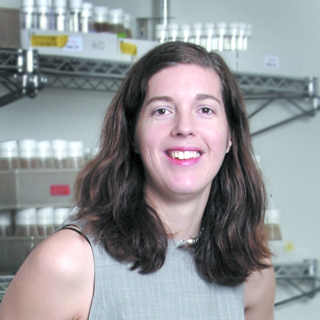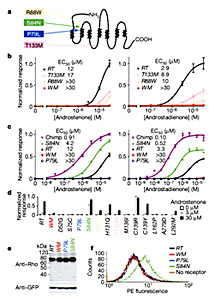How Genes Influence the Human Sense of Smell

Vosshall, Leslie
Whether a person likes the smell of pungent cheese or cilantro depends in part upon the preferences of their culture. But there are enormous differences among individuals in how they interpret and react to smells—choose almost any odor, and some people will find it pleasant, others will be repulsed, and still others will be unable to smell it at all. Leslie Vosshall (1965 - ) wanted to know whether genetic variation in odorant receptors could account for this variation. In research that investigated the activity of odorant receptors in cells grown in tissue culture as well as sensitivity to particular smells in human subjects at the Rockefeller Hospital, Vosshall and colleagues for the first time linked variations in a gene to variation in odor perception.
Humans have about 1000 different genes—representing a remarkable 5 percent of all of their genes—that direct the olfaction, or smell, receptors. These receptors line the olfactory epithelium, a small patch of cells high in the nasal passage. About 400 of these can make functional odorant receptors, each of which is sensitive to particular odorant molecules. Vosshall studied olfactory responses to two closely related steroids, androstenone and androstadienone, which are components of male sweat. Many people react strongly to the odor of these steroids, finding them either sweet and floral or rank and sweaty. Using a cell-based assay, Vosshall's collaborators tested 355 human odorant receptors for their response to the steroids. The receptor encoded by the gene OR7D4 was most strongly activated. Further studies both in vitro and in human subjects revealed that some common variants (single nucleotide polymorphisms, or SNPs) of OR7D4 impair its function. When 391 human subjects rated the smell of androstenone for its quality, intensity, and pleasantness, the researchers found that differences in OR7D4 affected both the threshold at which people could detect the odor and the whether the smell was pleasant or offensive. People who found the smell repulsive were more likely to have two functional copies of OR7D4; those who perceived it as a more mild smell tended to have one or two impaired copies of the gene.

Functional characterization of OR7D4 polymorphisms. From Nature, 2007, 449: 468-472
The Vosshall laboratory is extending these studies with human subjects to better understand correlations between genetic variability in odorant receptor genes and physiological and psychological responses to odors. These projects are part of the laboratory's larger goal to understand the genetic and neuronal basis of how odors guide behaviors. Vosshall has carried out much of her work in fruit flies. In the process of creating a map of the fruit fly's olfactory system, she discovered, among other things, that insect smell receptors differ from those of humans. Vosshall also studies mosquito genetics to understand their olfaction and feeding behavior-in other words, what attracts them to suck blood from humans.
Leslie B. Vosshall received the AB from Columbia University (1987) and the PhD from Rockefeller University (1993). She conducted postdoctoral training with Richard Axel (Nobel Prize, 2004) at Columbia and returned to Rockefeller as an assistant professor in 2000 where she rose to Chemers Family Associate Professor. She was named an investigator of the Howard Hughes Medical Institute in 2008 and is a past recipient of awards from the John Merck, Beckman, and McKnight Foundations. Vosshall is the recipient of a 2002 Presidential Early Career Award for Scientists and Engineers, a 2005 New York City Mayor's Young Investigator Award for Excellence in Science and Technology, a 2007 Blavatnik Award for Young Scientists, and the 2009 Lawrence C. Katz Prize from Duke University.
Selected Publications
Keller A*, Zhuang H*, Chi Q, Vosshall LB, and Matsunami H (*equal contribution). Genetic variation in a human odorant receptor alters odour perception. Nature, 2007, 449: 468-472
Further Reading
Keller A and Vosshall LB. Human olfactory psychophysics. Curr Biol, 2004, 14:R875-8
Keller A and Vosshall LB. Better smelling through genetics: mammalian odor perception. Curr Opin Neurobiol, 2008, 18:364-369
Vosshall LB. Minireview: Scent of a fly. Neuron, 2008, 59:685-689
Links
Leslie Vosshall, Laboratory of Neurogenetics and Behavior
http://vosshall.rockefeller.edu/
Protocols for Laboratory of Neurogenetics and Behavior- Olfactory (Smell) Studies
http://www.rucares.org/clinicalstudies/list.php?cat=41&listby=
Leslie B. Vosshall, HHMI Investigator
http://www.hhmi.org/research/investigators/vosshall_bio.html
